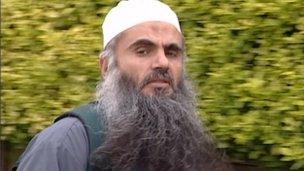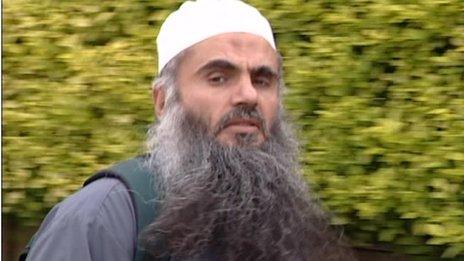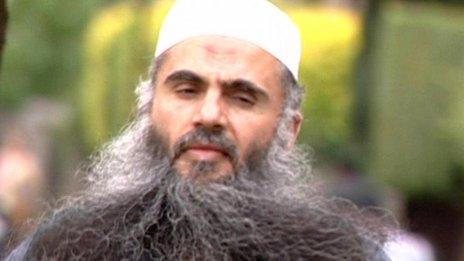Radical preacher Abu Qatada 'should be freed'
- Published

Abu Qatada has had a long battle against removal from the UK
Radical cleric Abu Qatada should be freed from jail because he has been held too long, his lawyer told a bail hearing.
Ed Fitzgerald QC told the Special Immigration Appeals Commission: "There comes a time when it's just too long, however grave the risks."
Home Office lawyers oppose attempts to bail him while he fights deportation.
The European Court of Human Rights says if he were deported Jordan might use evidence obtained by torture.
Abu Qatada, who is being held at Long Lartin prison in Worcestershire, is applying to be released on bail.
Home Secretary Theresa May wants him to stay in jail while Britain seeks assurances from the Jordanian authorities that evidence gained through torture would not be used against him.
But his lawyers told a senior High Court judge the Strasbourg court's block on the preacher's removal means Mrs May can no longer legally keep him in prison.
They say his case could drag on for another two years and he should be released, regardless of the risks he may pose.
The UK is trying to strike a new deal with Jordan to satisfy the European Court that Abu Qatada would not be tried on evidence obtained from torture.
Mr Fitzgerald said: "Mr Othman (Abu Qatada's real name) has already been detained for too long for it to be reasonable for deportation. He has already been detained for six and a half years for deportation."
He said that was "against a background of almost nine years detention without charges on the grounds of national security".
Mr Fitzgerald said: "The detention has now gone on for too long to be reasonable or lawful and there is no prospect of the detention ending in any reasonable period."
'Risk of absconding'
He said that however great the risk of absconding or further offending was "there comes a point when it's just too long".
Abu Qatada is understood to have been held "longer than any other detainee in modern immigration history".
But Tim Eicke QC, for the Home Secretary, said she did not accept his detention was unlawful.
He said the time Abu Qatada had been held "has to be weighed against the risks" and "he poses a particularly serious risk to the UK".
"The secretary of state has also taken all steps to diligently try to achieve removal and deportation as soon as possible," he added.
In its judgement, external earlier in January, the European Court said the UK had struck a sound deal with Jordan to guarantee the alleged extremist's human rights - but that the cleric could still be the victim of injustice if deported.
He has been convicted in his absence of terrorism offences and is likely to face trial if returned. He alleges that the co-defendants in the cases implicated him after they were tortured - meaning he could not face a fair trial.
The cleric has been imprisoned or held on strict curfew conditions for six and a half years.
Abu Qatada had been detained for two years and 10 months in prison, followed by six months on curfew - and then another three years and two months back in jail.
Although the European Court of Human Right's judgement has blocked Abu Qatada's deportation for now, it has not ruled against his removal from the UK if the government can get a guarantee from Jordan that torture evidence will not be used in his case.
- Published17 January 2012

- Published26 June 2014

- Published9 May 2012
